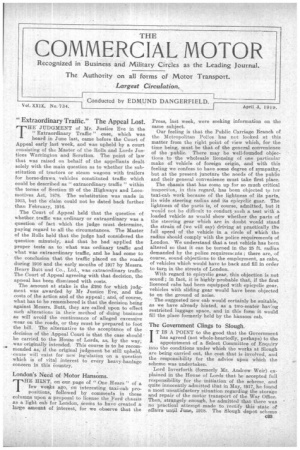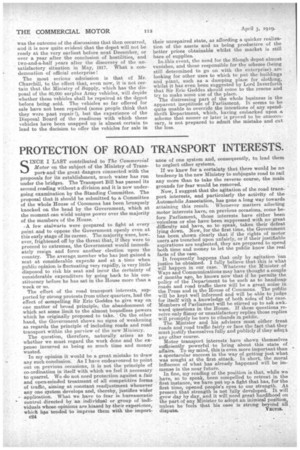"Extraordinary Traffic." The Appeal Lost.
Page 1

Page 2

If you've noticed an error in this article please click here to report it so we can fix it.
THE JUDGMENT of Mr. Justice Eve in the "Extraordinary Traffic" case, which was heard in June last, came before the Court of Appeal early last week, and was upheld by a court consisting of the Master of the IUDs and Lords Justices Warrington and Scrutton. The point of law that was raised on behalf of the appellants dealt solely with the main question as to whether the substitution of tractors or steam wagons with trailers for horse-drawn, vehicles constituted traffic which could be described as " extraordinary traffic" within the terms of Section 29 of the Highways and Locomotives Act, 18M. The substitution was made in 1913, but the claim could not be dated back further than February, 1916.
The Court of Appeal held that the question of whether traffic was ordinary or extraordinary was a question of fact which the judge must determine, paying regard to all the circumstances. The Master of the Rolls held that the judge had considered the question minutely, and that he had applied the proper tests as to what was ordinary traffic and what was extraordinary traffic, and he had come to the conclusion that the traffic placed on the roads during 1916 and the early months of 1917 by Messrs. Henry Butt and Co., Ltd., was extraordinary traffic. The Court of Appeal agreeing with that decision, the appeal has been dismissed with costs.
• The amount at stake is the £280 for which judgment was awarded by Mr Justice Eve, and the costs of the action and of the appeal ; and, of course, what has to be remembered is that the decision being against Messrs. Butt, they are called upon to effect such alterations in their method of doing business as will avoid the continuance of alleged excessive -wear on the roads, or they must be prepared to foot the bill. The alternative to the acceptance of the . . .
decision of the Appeal Court is that the case should' be carried to the House of Lords, as, by the way, was•originally intended. This course is to be recommended as, if the original judgment be.still upheld, 'cause will exist for neW legislation on a question which is of vital interest to every heavy-haulage
concern in this eowitry. .
London's Need of Motor Hansoms.
THE HINT, on our page of "One Hears" of a few weeks ago, on interesting taxi-cab propositions, followed by comments in these columns upon a proposal to license the Ford chassis as a light cab for London, seems to have created a large amount of interest, for we observe that the
Press, last week, were seeking information on the same subject.
Our feeling is that the Public Carriage Branch of the Metropolitan Police has not looked at this matter from the right point of view which, for the time being, must be that of the general convenience of the public. There may be well-founded objections to the wholesale licensing of one particular make of vehicle of foreign origin, and with this feeling we confess to have some degree of sympathy, but at the present juncture the needs of the public and their general convenience must take first place.
The chassis that has come up for so much critical inspection, in this regard, has been objected to for taxi-cab work because of the lightness of its parts, its wide steering radius and its epicyclic gear. The lightness of the parts is, of course, admitted, but it would not be difficult to conduct such a test with a loaded vehicle as wauld show whether the parts of the steering gear which are in doubt would stand the strain of (we will say) driving at practically the full speed of the vehicle in a circle of which the radius Should comply with the police requirements of London. We understand that a test vehicle has been altered so that it can be turned in the 25 ft. radius demanded by the police requirements; there are, of course, sound objections-to the employment, as cabs, of vehicles which would have to back and fill in order to turn in the streets of London.
With regard to epicyclic gear, this objection is not sound; in fact, it is highly probable that, if the first licenced cabs had been equipped with epicyclic gear, vehicles with sliding gear would have been objected to on the ground of noise.
The suggested new cab would certainly be suitable, as we have already hinted, as a two-seater having restricted luggage space, and in this form it would fill the place formerly held by the hansom cab.
The Government Clings to Slough.
IT IS A POINT to the good that the Government has agreed (not whole-heartedly, perhaps) to the appointment of a Select Committee of Enquiry into the conditions under which the works at Slough are being carried out, the cost that is involved, and the responsibility for the advice upon which the scheme was undertaken.
Lord Inverforth (formerly Mr. Andrew Weir) explained in the House of Lords that he accepted full responsibility for the initiation of the scheme, and quite innocently admitted that in May, 1917, he found a most unsatisfactory situation regarding the storage and repair of the motor transport of the War Office. Then, strangely enough, he admitted thatthere was no practical attempt made to rectify this state of affairs until June, 1918. The Slough depot scheme • 023 was the outcome of the discussions that then occurred, and it is now quite evident that the depot will not be ready at the very earliest before next December, or over a, year after the conclusion of hostilities, and two-and-a-half years after the discovery of the unsatisfactory situation in May, 1917. What a condemnation of official enterprise !
The most serious admission is that of Mr. Churchill, to the effect that, even now, it is not certain that the Ministry of Supply, which has the disposal of the 80,000 surplus Army vehicles, will decide whether these vehicles shall be repaired at the depot before being sold. The vehicles so far offered for sale have not been repaired (some people think that they were past repair !), but the experience of the Disposal Board of the readiness with which these vehicles have been snapped up is almost certain to lead to the decision to offer the vehicles for sale in their unrepaired state, as affording a quicker realization of the assets and as being productive of the better prices obtainable whilst the market is still bare of supplies.
In. this event, the need for the Slough depot almost vanishes, and those responsible for the scheme (being still determined to go on with the enterprise) are looking for other uses to which to put the buildings and plant, such as a dumping place for clothing, whilst it has even been suggested by Lord Inverforth that Sir Erie Geddes should come to the rescue and try to make some use of the place. The distressing part of the whole business is the apparent ineptitude of Parliament. It seems to be quite unable to override the intentions of any spendthrift Department, which, having embarked upon a scheme that sooner or later is proved to be unnecessary, is not prepared to admit the mistake and cut the loss.






















